 Ultra Fan Guide to Ayase Haruka
Ultra Fan Guide to Ayase Haruka
Maybe some of you know the following situation: In the comment section below a drama, one MDLer asked if this drama has a happy ending. Someone answered "yes". You watched the drama and were surprised at the end because, from your point of view, this was not a happy ending.
After experiencing this, two questions came to my mind:
- Why would someone want to know if there is a happy ending before watching a drama?
- How come the evaluation of an ending could be so different?
In order to get answers to my questions, I created a survey. Many thanks to the 147 participants who submitted their answers to the questions! Here are the results combined with some thoughts about them.
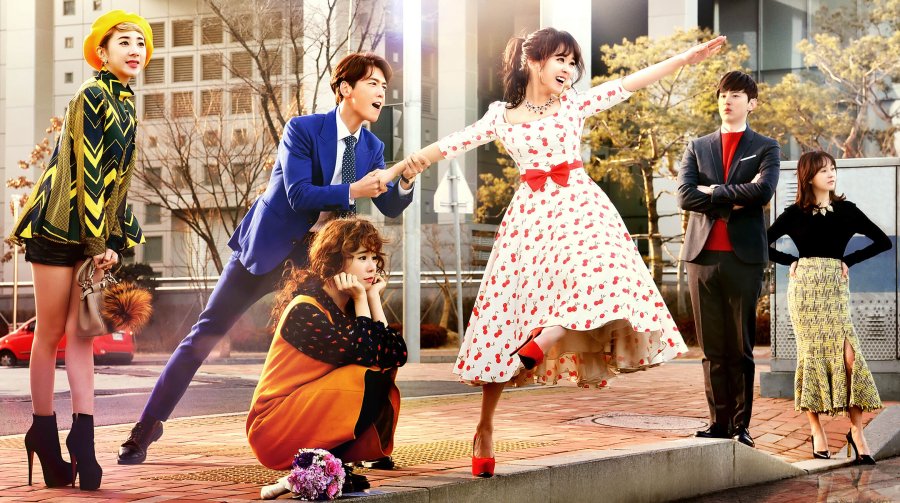
At first, the attendees got asked which kind of ending they prefer. They had to choose one out of 4 options. It was interesting that none chose "Sad Ending" as their preferred ending and only 4 % selected "Bittersweet Ending" as the favorite way to end a drama. Most participants (49 %) want a drama to end with a "Happy Ending". Interesting is that almost as many of them (47 %) prefer a "Realistic Ending". Please keep this in mind while reading the following aspects.
Checking the ending beforehand?
The survey included the question of whether the participants check if a drama has a happy ending before they start watching it. 62 % of the attendees check out the ending beforehand at least from time to time.
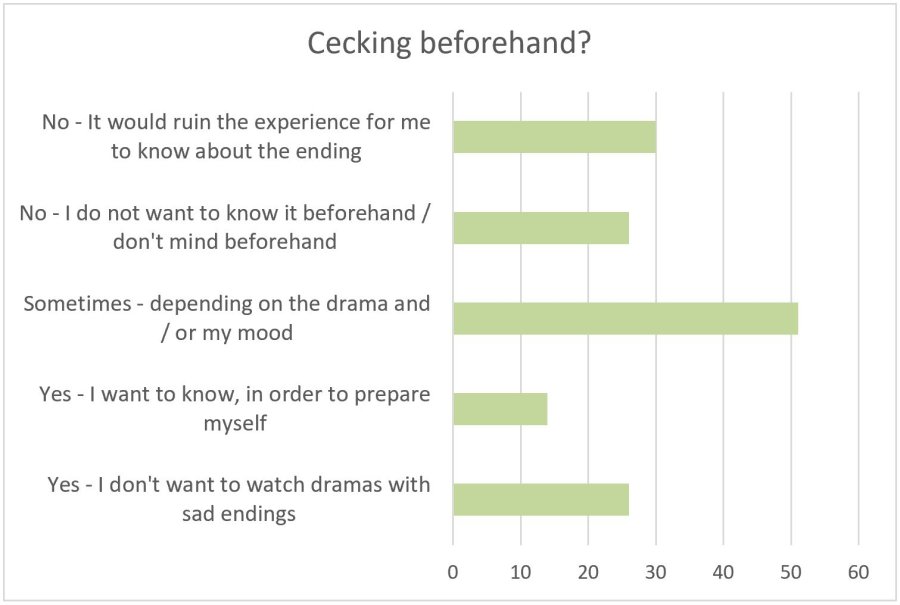
38 % do not want to know the ending. For most of them, it ruins their experience, so please do not forget the spoiler tag when you answer a happy ending-related question!
Most participants (35 %) only want to know about the ending from time to time, depending on the drama or their mood.
For 18 %, it is important to know the ending in order to avoid sad endings. This seems to be a very emotional point for some MDLers like this one who stated: "This is such a serious topic for me because if a drama seems like it isn't going to have a happy ending, I may give up on it because I am very sensitive and cry on even small issues."
Other participants (10 %) need the information in order to prepare themselves for the things which might happen. However, usually, it is unknown what exactly the person who asked about the ending needs to know for preparation. One of the participants, for example, provided a pretty specific case: "...if one of the main leads die. There are dramas/situations when I'm okay with that, but I like to be (emotionally) prepared."
Misunderstandings?
Thinking of the emotionality of this topic let us come back to the situation described above. It was formulated like this in the survey:
Did you experience the following situation at least once? You asked if a certain drama has a happy ending. Someone answered "yes". You watched the drama and were surprised at the end because, from your point of view, this was not a happy ending.
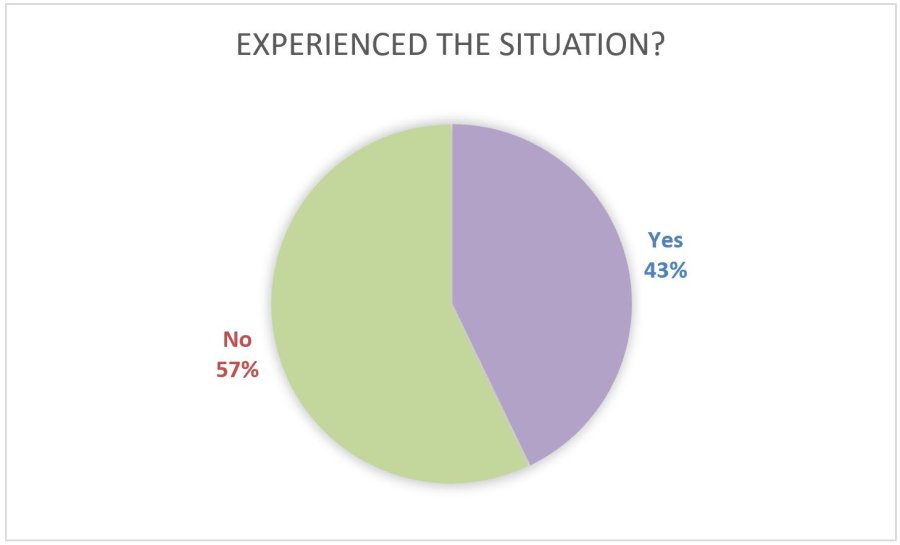
70 participants (48 %) stated that they usually do not ask if a drama has a happy ending. Therefore, they are excluded from this pie chart.
It is obvious that it happens pretty often that the answer to this question does not match the judgment of the enquirer. However, it is also possible to get a positive surprise like the following MDLer experienced: "It happened to me the other way around... they said 'no' and I watched it and thought it was happy."
But thinking about it... if someone asked for it specifically, maybe a positive surprise is not good, either?
What is a happy ending?
The definition for happy endings on Wikipedia is the following:
"...an ending of the plot of a work of fiction in which almost everything turns out for the best for the main protagonists and their sidekicks, while the main villains/antagonists are defeated."
Inspired by this definition, for the survey, 10 ways of ending a show were listed based on dramas of different genres. The participants were encouraged to think of all genres they usually watch and choose as many answer options as they liked. The amount of chosen answers per user varied between 1 and 10.
These were options:
- The main leads end up together, the world is safe, the side characters also got what they desired, and the evil is defeated.
- Main leads end up together, the evil is defeated, some side characters are dead or unhappy.
- The world is down in chaos, some side character died, but the main leads reached the safe spot.
- A lot of characters suffered or died but the evil which was a suffering character itself got killed.
- At least one of the main leads died, but the evil is defeated/the world is saved.
- The evil is defeated, most side characters are safe and sound. However, one of the main leads dies, and the other waits 400 years for their reincarnation.
- The world is saved, most side characters survived, both leads died and met up in the afterlife.
- The main leads end up together as a happy couple, although the ML tormented and abused her before.
- The issue is solved, the main leads do not end up together, but each of them starts a better life for themselves.
- The case is solved, most characters are safe, but the evil mastermind got away.
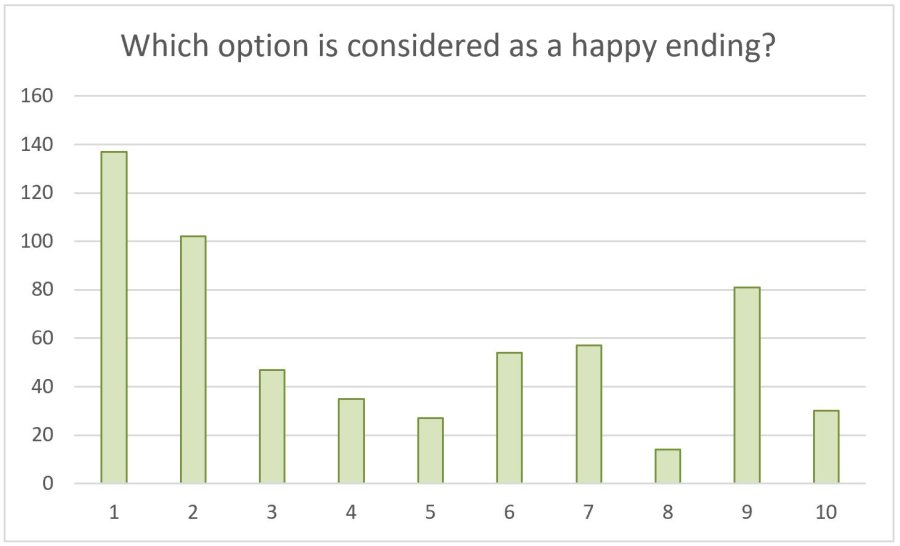
Interesting that 12 participants did not consider option 1, which matches the Wikipedia definition the most, as a happy ending. However, most of the 12 persons do not mind if an ending is sad, bitter-sweet, or happy. One of them stated: "I like to experience plenty of emotions when watching stuff, so I tend to rate dramas and films based on the emotional impact they had on me, and I don't mind if that impact is incredibly sad..."
65 % of all participants decided that option 2 is a valid happy ending. As following MDLer said, maybe it feels happy but more realistic if not everything is coming up roses: "While most times I care about HE for the main characters - I find that it's much more important if the ending, even if it's not the conventional happy ending, fits realistically with the story."
It was noticeable that a happy ending does not mean the same for everyone. For example, this participant thinks: "Happy ending means the bad guys got their karma." Other than the person who wrote this, 20 % of the participants also chose option 10 which includes that the evil mastermind did not get fully defeated.
Rather fewer participants think that a happy ever after for a couple with a violent history is considered as a happy ending (10 %). In contrast to that, 55 % of the users consider it as happy when the issue is solved and the main leads do not end up together, but each of them starts a better life for themselves.
For some MDLers (18 %), the death of at least one of the main leads does not ruin the happy ending. Most of them prefer a realistic ending over a purely happy ending. But at the latest now, it is pretty clear that the judgment about an ending could totally differ for the person who wants to know about it and the person who answers.
Thinking of the above-mentioned situation, it is more interesting to check how many answer patterns match each other. The pattern in this case means how many options combined with which options were chosen. The answer pattern of 19 % of the participants does not match with any result of another person who attended the survey. 45 % of participants match with only one other person. The highest amount of matching persons were 15 persons (10 %) and all of them only chose option 1.
Why do you need a happy ending?
Afterward, they got asked why they want or even need a happy ending. They could give as many answers as they wanted. Six participants chose every positive (pro happy ending) option, like the one who stated: "I'm a softie for happy endings :((("
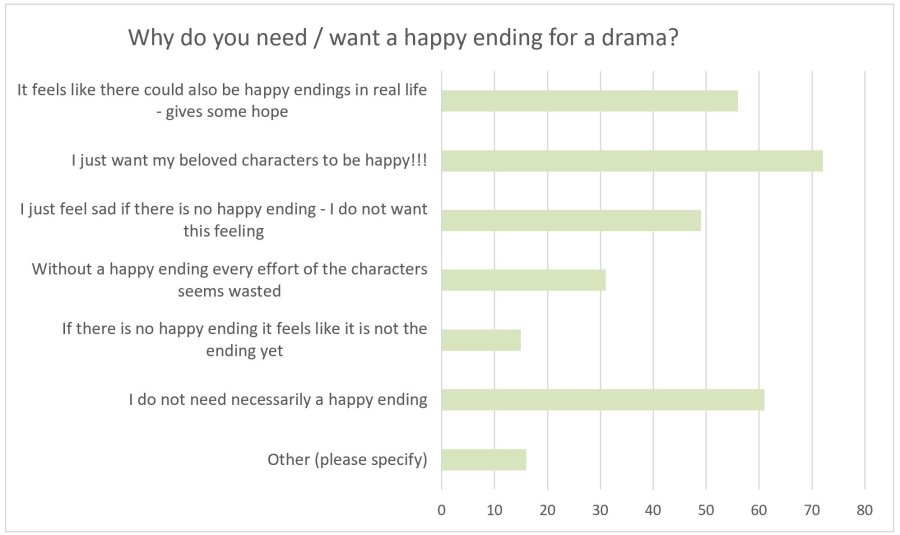
The most-given answer (50 %) was: I want my beloved characters to be happy. 21 % also think that the effort the drama characters put in during their journey seems to be wasted if there is no happy ending. Therefore, many of you are emotionally very involved and empathize with the drama characters, such as this participant: "...I know they are fictional characters and haven't suffered, but my stupid heart still moves as if they feel pain and well, it, therefore, makes me suffer, too..."
39 % of the participants derive hope from a drama's happy ending that is also possible in real life, and 34 % do not want to feel sad. In the comment part of the survey, it stood out that many of the participants have to deal with hardships in real life and watch dramas to escape or in order to feel better. It is also noticeable in some answers participants could give for this question:
"Life is tough - things are v difficult at home due to serious illness in the family, so I watch for a bit of escape, can’t cope with bad things both in drama and in real life."
"Drama is my escape, so I don't want to watch something that reminds me how horrible real life is."
"You watch a drama as an escape from the sad real world, you want a happy ending in the fantastical drama world"
10 % feel like the closure of the story is missing when there is no happy ending. It seems to be a certain philosophy as already the Irish writer Oscar Wild said: “Everything is going to be fine in the end. If it's not found it's not the end.”
Influence on rating
Considering a happy ending as a very emotional factor that is important to almost half of the participants, it is also conceivable that the ending will influence the overall rating of a drama. Therefore, the participants got asked how a happy or a sad ending influences their drama rating. They had to choose only one answer.
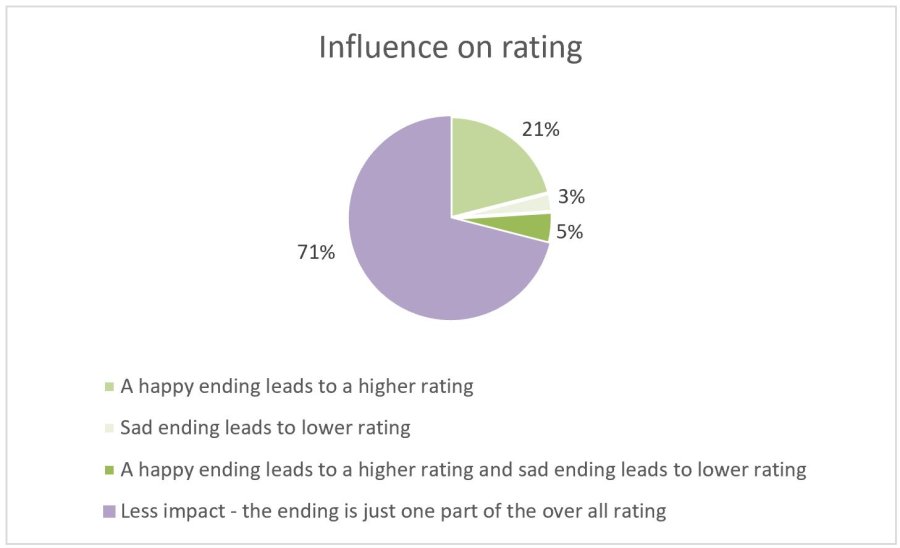
Most attendees (71 %) of the survey stated that a happy ending does not necessarily lead to a specific rating behavior because if an ending is happy or not is only a part of the drama experience. In the comments, it was noticeable that some of them wrote that they dislike when a happy ending is not well written or feels forced, like the following MDLer wrote: "...sometimes happy endings are forced and unlogical which I think destroys my overall experience of watching the drama"
For 20 %, a happy ending leads to a higher rating, but a sad ending seems to not influence their rating. Interesting is that less than half of them check on the ending before watching a drama, such as following MDLer who said: "I don't watch dramas for realistic endings, I watch them for impossible happy endings so when there's not a happy ending, I feel like it's a waste of my time."
So imagine a happy ending is very important to a person and the surprise that everything went well makes it even more intense, it is only logical that it leads to a higher rating for this person because this kind of watcher feels very excited at the moment of rating.
On the other hand, there are some participants (3 %) that give a lower rating to a drama because of a sad ending. One of the possible reasons was commented by this participant: "A sad ending means that that drama is gonna be in my mind for long, even if I loved it I will never be able to rewatch it bcoz the characters that I saw developing are not gonna end up as their will."
Difference in Genres
So far it is obvious that a happy ending does not mean the same for every drama lover. However, is the importance of a happy ending depending on the genre of the drama? The participants got asked for which genre they judge a happy ending as an important factor. They got the answer options shown in the diagram below and could choose as many points as they wanted. 82 % of all participants chose less than 5 answer options.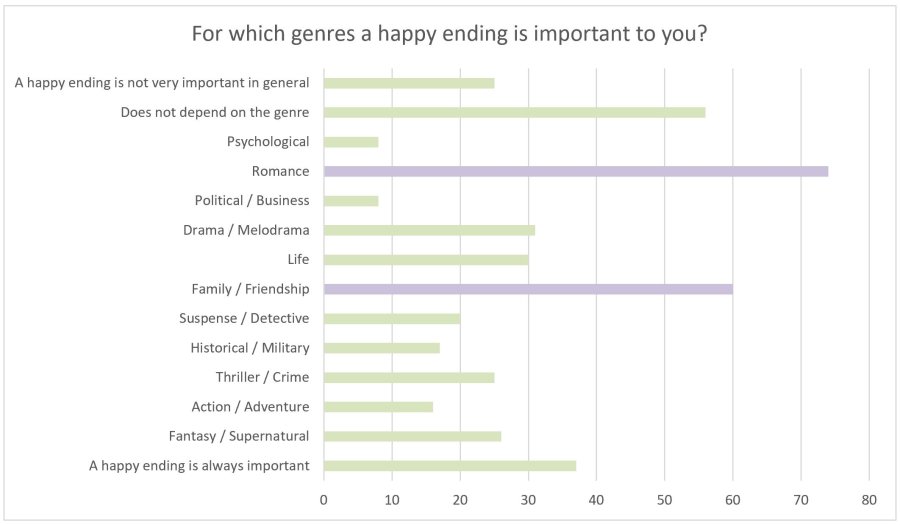
38 % chose that the importance of a happy ending is not dependent on the genre. However, more than half of them chose more than one option and only 5 % of them chose 13 options. Therefore, it is to assume that it is more necessary for some genres than for others.
Obviously, romance is the genre most participants (51 %) want a happy ending for. One MDLer described it like this: "for the romance genre, if there's no happy ending it feels like you have wasted all your time because for me the happy ending is the final aim of that kind of drama."
The second most chosen genre was Family/Friendship (42 %). Maybe as close as a drama plot can be to reality, the more a happy ending is wanted. A participant wrote: "it gives me hope for real-life issues..."
Following the just-mentioned theory, the reader of the article could wonder why genres Life (21 %) and Drama/Melodrama (22 %) got chosen less often. Maybe it is because of the nature of these genres. Someone who watches a drama about terminal illness or suicide as a topic probably does not expect a happy ending, like this participant said: "...If it was an overall tragic and melodramatic drama, I would not be expecting a happy ending. A sad ending might really make me cry, but sometimes those are the ones that leave a lasting impression. Some dramas give a message, a message about life and the struggles you go through."
The difference in the selected options could also originate from the number of watches. Maybe there are more persons who watch romance than psychological dramas.
Conclusion
No doubt that there are many different opinions on whether an ending is considered happy or not. One participant stated it like this: "Happy endings are different for everyone. Some think that if the world is saved with a few deaths (maybe including the leads) then it is a happy ending. Some think that if everyone survived (mostly main characters) and the world is saved, then it's a happy ending."
In conclusion, if someone really wants to know about the ending of the drama, this person should specify their question in order to get the right answer and to not experience a sad surprise.
However, be nice to each other and never forget to have fun!

What kind of ending do you consider as happy?
What do you think about the mismatch of evaluations?
What kind of ending do you prefer?
Editing: BrightestStar (2nd editor)











